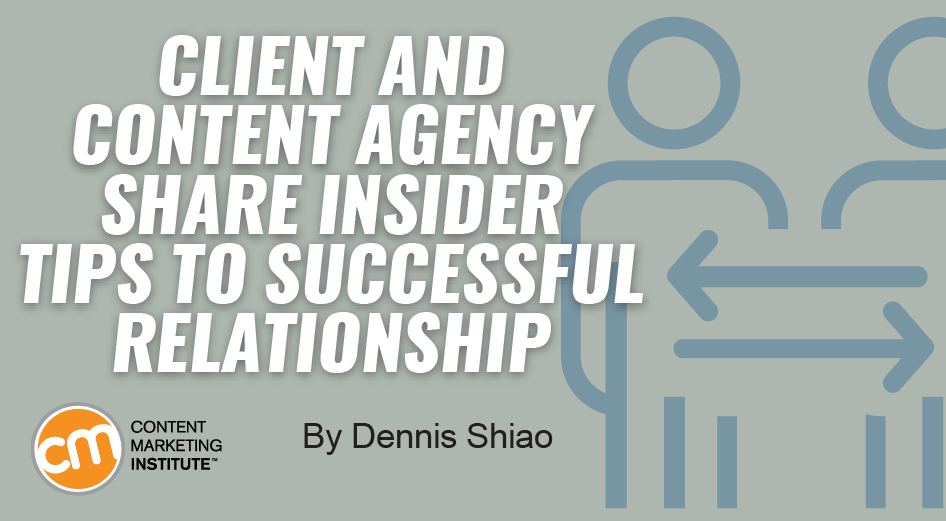When hiring a content marketing agency, brands ought to plan for a long-term relationship. An agency aligned with the client’s goals might say, “Maybe, you don’t need more content … We can help you optimize and repurpose what you already have.” Shared goals also guide project decisions. Alenka knew she had to think differently about the relationship with a content marketing agency. Agencies need to think about both the client and the client’s audience. “Help (clients) out. She finds it useful and productive to share her ideas with the agency. If we share our expertise, not look down on them,” Alenka says. They continue their long-term partnership today, collaborating for a successful content marketing program. What works well? Cover image by Joseph Kalinowski/Content Marketing Institute Author: Dennis Shiao Dennis is an independent marketing consultant who works with brands on content marketing, product messaging, and social media marketing.

To succeed in content marketing, you need to be in for the long term.
With direct response marketing, ROI can be measured in weeks or months. With content marketing, however, it can take a year or more to see a return on your efforts. When hiring a content marketing agency, brands ought to plan for a long-term relationship.
Alenka Bester, head of digital content marketing at Zavarovalnica Triglav, and Nenad Senic, brand editor at PM, poslovni mediji, discuss how in a presentation at Content Marketing World, Client-Agency Collaboration: How to Evolve Together to Deliver Content Marketing Results.
Alenka and Nenad share their journey of working together, along with advice on achieving success in the client-agency partnership.
Client and agency sides: Establish common goals
As with any relationship, success is difficult when competing interests are at play. If you want “x” and I want “z”, we’ll probably end up butting heads and achieve neither.
“For a successful, long-term relationship, you need to determine common goals. (The) agency’s goals should be aligned with (the) client’s goals,” says Alenka.
Often, an agency’s goals are to create compelling content for the client and increase its business revenue from the client. While those are valid goals, Alenka says they should be secondary, putting the client’s goals and interests first: “You have to ask yourselves, ‘Is this really what your client needs and will it bring them closer to their goals?’”
For example, Alenka’s team felt proud of one project’s content, but the metrics showed that it fell flat with the target audience. An agency motivated by growing client revenue might blame the advertising spend as too little or propose creating new content. An agency aligned with the client’s goals might say, “Maybe, you don’t need more content … We can help you optimize and repurpose what you already have.”
Shared goals also guide project decisions. “You should always know what your end goal is,” Alenka says. “Stay true to your mission and continue working for that. It will make your relationship with the agency much easier, because they will know what to expect.”
Client side: Think differently about the relationship
Brands have relationships with numerous agencies – advertising, SEO, paid search, social media marketing, and more.
Alenka knew she had to think differently about the relationship with a content marketing agency.
Her organization typically works with agencies on two-year contracts for an associated campaign. For new campaigns, the company reopened the bidding process.
“The conventional contract arrangements wouldn’t work for us because we would never be able to achieve consistency as a series of campaigns,” Alenka says.
She bent a few internal rules to establish a permanent contract with a content marketing agency, while limiting the scope of work to specific content marketing projects.
“The contract enabled us to set up a functioning, consistent program around a content hub supported by email and social media distribution,” Alenka says.
The contract was signed with Nenad’s agency.
Agency side: Advocate for the client’s audience
Success results from a focus on the audience, not on you or the brand. Agencies need to think about both the client and the client’s audience.
As Nenad explains, “From the agency point of view, we have to find the intersection between the client’s interests and the audience’s interests. As an agency, we’re a protector…

COMMENTS